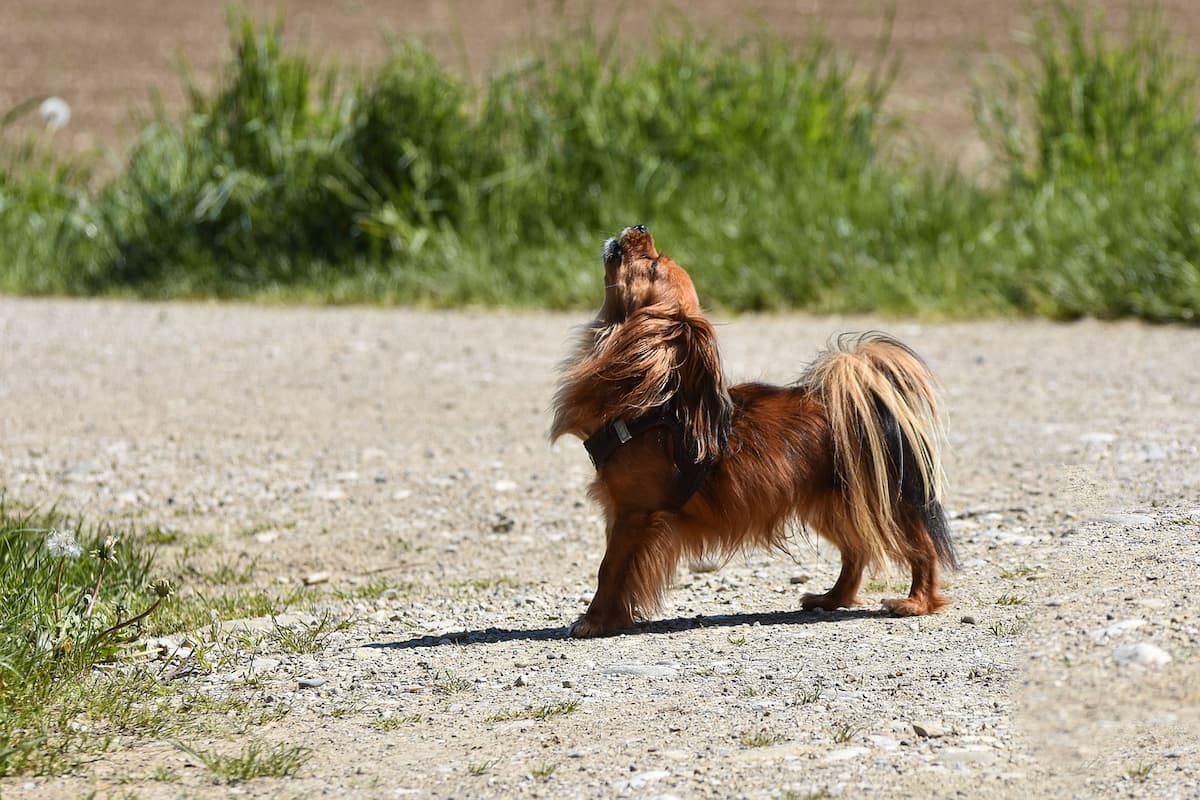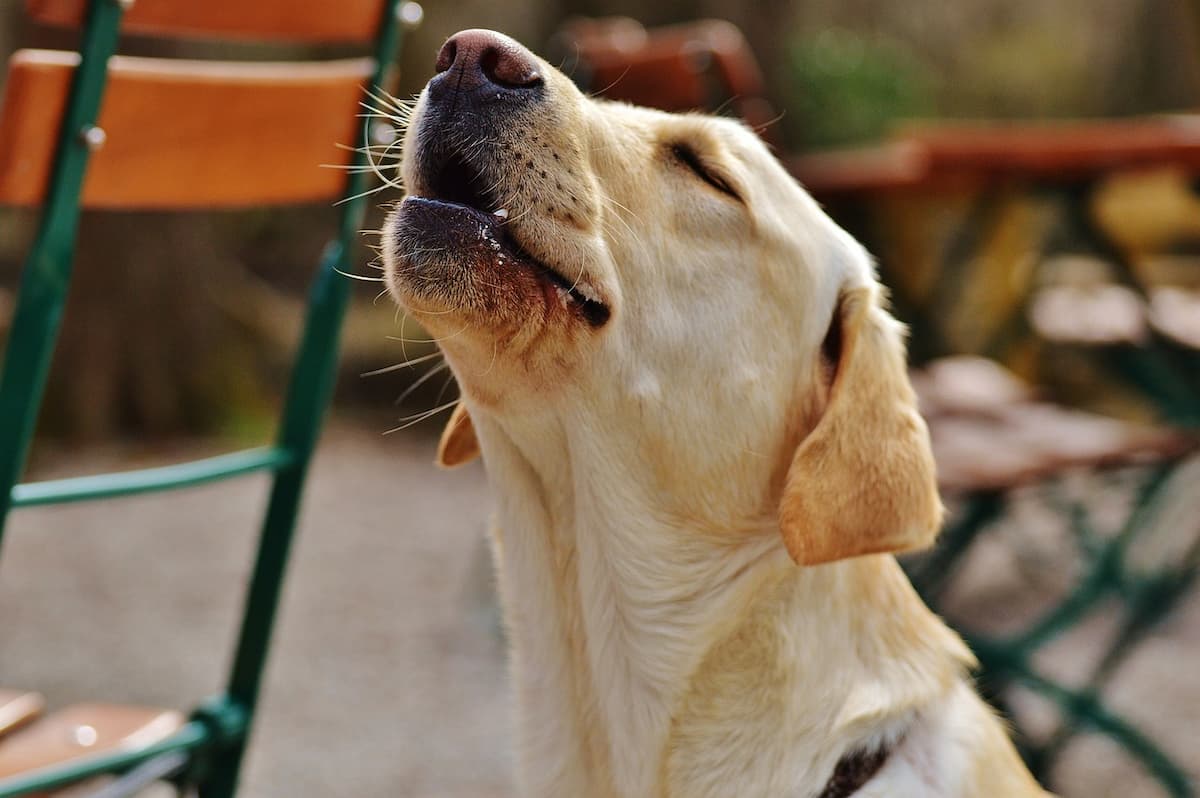Have you ever wondered why dogs can’t seem to resist joining in on the howling action when they hear their fellow furry friends howling in the distance?
It’s as if their canine instincts kick into high gear, compelling them to let out a soulful cry that sends chills down our spines.
Read on to learn the reasons behind this perculiar behavior.
Understanding Why Dogs Howl When They Hear Other Dogs Howl
We’ve all experienced that delightful (or sometimes annoying) chorus of barking and howling when one dog starts the serenade and others soon join in.
But have you ever wondered why this happens?
What goes on in a dog’s mind that compels them to join in the howling fun?
One of the main reasons dogs howl when they hear other dogs howl is pure instinct.
Just like their wild ancestors, wolves, howling is a form of communication for dogs.
It serves as a way to relay messages to other members of their pack or social group.
When one dog starts to howl, it activates a primal response in other dogs, triggering their own instincts to join in.
Think of it as a canine version of a group chat – each dog adding their own voice to the conversation, reinforcing their bond and connection as a pack.
It’s a way for them to say, “I’m here, I hear you, and I’m part of this group too!”
Another reason dogs howl in response to other dogs is simply because it’s contagious.
Yes, you read that right – contagious!
Just like yawning or laughing can be infectious among humans, howling can have the same effect on our four-legged friends.
When dogs hear the familiar sound of their kindred spirits letting loose, it triggers their natural inclination to join in the symphony.
It’s similar to the way we might tap our foot or bob our head when we hear a catchy tune.
So, next time you hear your neighbor’s dog howling in the distance, remember that your furry companion may not be able to resist the call of the wild!
FAQ
Q: Is it just a coincidence that dogs howl together, or is there a deeper reason?
A: Great question!
You see, dogs are pack animals at heart, and they have a strong instinctual need to communicate with one another.
Howling is one of their many methods of expressing themselves and staying connected.
Q: What does howling actually mean for dogs?
A: When dogs howl, it serves as a social behavior, allowing them to determine their location in relation to others in their pack.
In the wild, packs of dogs often use howling to maintain contact when they’re out exploring or hunting separately.
It’s like a long-distance phone call to broadcast their location and gather the pack back together.
Q: That makes sense, but why do dogs feel the need to howl when they hear another dog howling?
A: Dogs have incredible hearing abilities, surpassing our own by a mile!
When they hear the sound of another dog howling, their instinctual response kicks in.
They see it as an invitation to engage in this social behavior, almost like saying, “Hey, I’m here too!”
Q: Does this behavior differ depending on the breed or age of the dog?
A: Absolutely!
Each dog breed has its own unique set of traits and characteristics.
Some breeds are more prone to howling, such as Huskies or Beagles, while others may rarely howl at all.
Additionally, younger dogs tend to be more easily influenced by the howling of others, as they are still in the learning and exploring phase of their lives.
Q: Are there any other reasons why dogs might howl?
A: Certainly!
Howling can also be triggered by other stimuli, like a loud siren or a musical instrument hitting a particular note.
In these cases, it’s their instinct to join in with a noise that resembles the sound they’re hearing.
It’s their way of participating and expressing themselves in response to something they find interesting or even irritating!
Q: Is there anything we can do to stop our dogs from howling excessively?
A: If your dog’s howling becomes excessive or bothersome, it’s essential to first identify the root cause.
It could be due to anxiety, boredom, or even a medical issue.
Consulting with a veterinarian or a professional dog trainer can help you determine the best course of action for your furry friend.
Q: Are there any situations where we should encourage our dogs to howl?
A: Absolutely!
If you have a howling enthusiast on your hands, it can be a fun and interactive experience to engage in their passion.
You can play some songs with distinct howling-like sounds or even have a good old-fashioned howl-along session.
It can be a bonding experience for both you and your pet!
So next time you hear your dog’s howl resonate through the neighborhood, remember, it’s their way of saying, ”I’m here, and I’m part of something bigger!
Bringing it All Together
From their ancestral connections to their close-knit social circles, it’s no wonder our furry friends find solace and camaraderie in these melodic symphonies of sound.
Next time you’re out for a stroll and your pup starts to sing along with a distant howl, remember the deep-rooted instincts that make this behavior so enchanting.
Whether it’s a form of communication or an expression of their emotions, our faithful companions are simply joining the chorus to connect with their pack.
So, let’s embrace the culture of howling among our furry friends and celebrate the beautiful bond they share.
It’s a testament to their loyalty, their heritage, and their undying love for each other.
And hey, who knows, maybe you’ll feel inspired enough to howl along with them.
After all, sometimes it’s good to let loose and join in the chorus of life’s simple joys!









